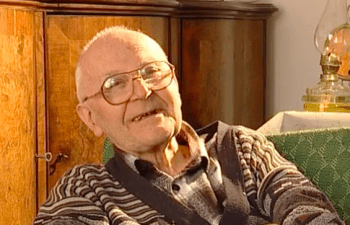Silvester Krcmery, Unbroken

As I was preparing to board the train in Bratislava this afternoon, my new friends there gave me an English-language copy of a 1996 memoir written by Dr. Silvester Krcmery (pron. “kirch-mary”), a Slovak Catholic physician and lay evangelist imprisoned and tortured by the Communist regime for his work spreading the Gospel. The book was printed in the US under the dull title Break Point, but the title of the English-language translation produced in Bratislava is much more pungent (and accurate): This Saved Us: How To Avoid Brainwashing.
I read it all on the four-hour train journey to Prague. The book is going to be indispensable to my work on my next book. Reading what that man and his prison comrades suffered makes me utterly intolerant of anyone wishing to minimize the horrors of Communism. I’m writing this tonight from my hotel room in Prague, which is a profoundly beautiful city. How a land like this could have given birth to the monsters who tortured so many innocent people is a mystery that ordinary human minds can’t penetrate.
There’s a lot to say about the Krcmery book, and I’ll try to get to it later. Before bedtime, though, I want to share a couple of relevant parts. He wrote the book in the 1990s, after the fall of Communism. He wrote about our world today:
We are so often naive in our thinking. We live, contented and safe, with the idea that in a civilized country, in the mostly cultured and democratic environment of our times, such a coercive regime is impossible. We forget that in unstable countries, a certain political structure can lead to indoctrination and terror, where individual elements and stages of brainwashing are already implemented. This, at first, is quite inconspicuous. However, often in a very short time, it can develop into a full undemocratic totalitarian system.
I’m interested in the development of a full democratic totalitarian system — this, in the sense that people will choose to surrender their political and religious freedom for something else (e.g., James Poulos’s idea of the Pink Police State). I’ll be exploring this in the book. In an afterword to the Krcmery memoir, a physician who knew him said that Krcmery’s book is above all a spiritual testimony, because the thing that “saved us” — meaning that kept Krcmery and others from losing their minds under torture and brutal confinement — was their deep and intense faith. The passages in which Krcmery talked about his spiritual exercises in prison; how he and other prisoners helped each other pray and memorize the Gospels, and ministered to each other; and how he absolutely refused to hate his persecutors — well, they are difficult to read with dry eyes. He publishes in the book transcripts from government trial records of his statements to the courts. In one of them, that brave man told his persecutors in trial, “You have power in your hands, but we have truth!”
He also publishes the trial court’s official verdicts against him. In one of them, the Communist court says that religious liberty is constitutionally guaranteed in Czechoslovakia, but that cannot mean tolerating anything that gets in the way of “building socialism.” For his part, Krcmery points out that the Communists insist that religious liberty exists because Czechs and Slovaks are allowed to go to church. Writes Krcmery:
“But Christ did not come into the world only so that people would go to church! ‘I am the Way, the Truth, and the Life’ (John 14:6). To live their faith: that is what religion and the Church are not allowed to do!”
Many progressives in contemporary America believe that religious freedom begins and ends with freedom to worship. They believe that no religious practice that in any way impedes the building of “social justice” should be tolerated. This stuff is, in theory, discomfitingly close to how the Communists thought about religion and its place in public life. Krcmery had become a disciple of Tomislav Kolakovic, a Croatian Jesuit who, in 1943, began preparing cells of Slovak Catholic laymen to resist the Communist dictatorship he foresaw coming after World War II. Maybe it’s time for American Christians to start looking for a new, and doubtless very different, Father Kolakovic.
The Krcmery friend, Dr. Alojz Rakus, says in his afterword that the intrinsic paranoia of Communist ideology had everything to do with the brutality of the persecution. Communists see the world as a total struggle of Us vs. Them — and there’s no way to escape the threat of Them, except by eliminating them from public life. If it comes to doing so physically, well, then it has to be done.
I don’t think we have many actual Communists in the US today, but there’s no question that antifa and the fanatical Social Justice Warrior types share that paranoia. When we see colleges and universities indoctrinating students in hatred of entire classes of people by race, sex, and creed, then know that something wicked is coming.
Subscribe for as little as $5/mo to start commenting on Rod’s blog.